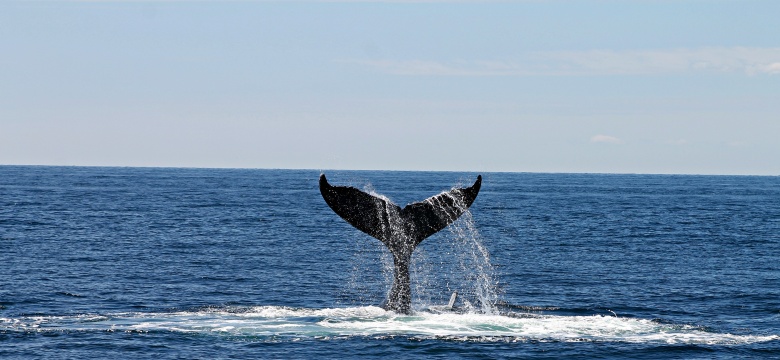Whale Watching Advisory

March through April is the peak time for spotting humpback whales around Bermuda. As part of journeying from their breeding grounds in the Caribbean to their feeding grounds on the eastern seaboard of North America and as far north as Greenland and Iceland, the whales swim through our waters. For the public, watching these majestic animals, spouting, breaching or swimming along slowly with a calf is a thrilling experience, and the Department of Environment and Natural Resources (DENR) wishes to remind the public of how to observe the whales safely.
To minimize the disturbance caused by whale watchers and ensure the safety of the boating public while they watch the whales, DENR has developed guidelines for whale watching, which are available at https://environment.bm/whale-watching-guidelines. The Department urges the public to familiarize themselves with these guidelines before whale watching. Specifically, boaters should not get closer than 100 meters (or 300 feet) to any whale. Whales will sometimes approach a boat of their own accord. If this occurs, put your engine in neutral and let the animal(s) come to you. If a whale tries to leave the area where you are in a boat, do not chase it. The public is also strongly advised not to swim with whales. No matter how docile they may appear, a whale could unintentionally strike a swimmer with a casual tail or fin slap, causing severe injury or even worse. Those tails and fins are big and heavy! Also, boaters and swimmers may not intend to be intrusive, but getting too close to the whales can disrupt feeding, nursing and migrating behaviours. Boats, in particular, can cause unintended injuries to a whale.
Boaters should also be aware of behaviour that indicates a whale is agitated or no longer interested in staying near a vessel. These may include:
• Regular changes in travelling direction or speed of swimming
• Tail slapping or trumpet blows
• Repetitive diving
• Hasty dives
• Changes in breathing patterns
• Increased time spent diving compared to time spent at the surface
• Changes in vocalization behaviour
Under the Protected Species Act 2003, it is an offence to injure, disturb or harass a humpback or sperm whale. A person who commits such an offence is liable to a fine of $25,000 or two years imprisonment on summary conviction. If you see a boat harassing a whale, don't hesitate to get in touch with the Fisheries Wardens at 535-4615 or the Operation Center of the Coast Guard at 294-0610. If you have a camera, please take photographs or video recordings of the harassment, including the boat name and registration number. Send that evidence to environment@gov.bm.